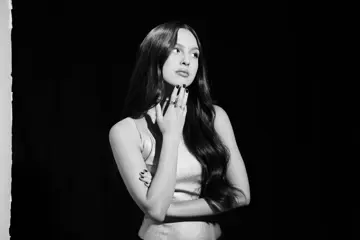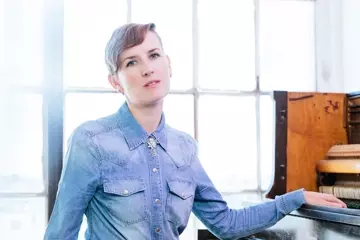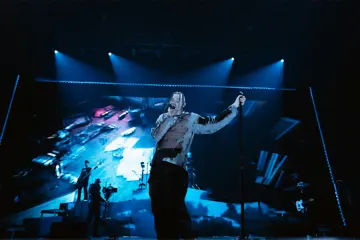 Rufus
RufusRUFUS's new record is an expansive and even engulfing listen at times, reflecting the subconscious feeling of unfamiliarity. Singer Tyrone Lindqvist says the writing process for the band's second album, the follow-up to the trio's impressive debut release, Atlas, took a little over year. Named after the term for a group of jellyfish, Bloom serendipitously marks the maturation of the band's sound as well as their writing method. "We were overseas in Berlin for two months and started the process over there this time," explains Lindqvist, who is sitting underneath the canopy of a tree in Sydney when The Music calls. "I would like to have been able to say that we then finished recording in Australia as we had seven months to work on it, but ultimately we ended up finishing it in various hotel rooms across North America."
"Even your regular routine is different in the sense that you don't know where you're going to get your coffee or watch a movie."
While their first record was largely written in the eastern states and coastal regions of Australia, Lindqvist describes the experience of writing while overseas as an opportunity to broaden their horizons. "You can kind of lose yourself in it, without the blocks of whatever commitments you might have with friends and family. Even your regular routine is different in the sense that you don't know where you're going to get your coffee or watch a movie. It forces you to try new things and gets you out of your little box inside your head."
There's an underlying theme of absence across much of the new album, as Lindqvist sings lines like, "I'm coming home for you," on the second single Like An Animal. The titles of songs including You Were Right and Say A Prayer For Me seem to further indicate a realisation inspired by separation and distance. While Lindqvist admits to struggling at times to find balance between touring and writing with the relationships he has with family and friends, he says the band didn't go into the writing or recording process with a theme in mind.
"I don't think we ever know what we're going to write about, or what's going to come out of the process. Halfway through the recording we'd written about five or six songs and we noticed that we were using the word 'home' a lot. We were laughing and thinking, 'We say this heaps.' I think that was from the fact that we're away a lot of the year, and don't see friends and family as much as we might like. That feeling when you reunite with either the place that you know, or a loved one that you haven't seen for a while and you just get to sit back on a couch with, has a certain feeling that's probably within the record."
Don't miss a beat with our FREE daily newsletter
It's an approach that's paid off, as Bloom manages to simultaneously sound in-the-moment and sentimental. "On the first album we were more involved with escapism, in the sense that we just took ourselves wherever we wanted to take ourselves. This record was probably then a reflection of where we were at situationally. In Berlin we were there for the winter, and it was pretty dark. We'd have four hours of light some days, and that was basically what inspired Daylight. It's literally us confessing that we have an addiction to sunshine in Australia."















